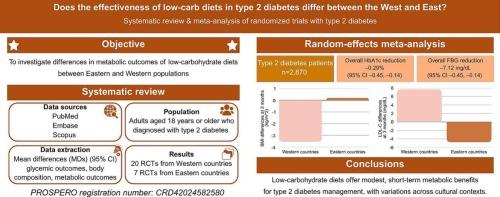Effectiveness of low-carbohydrate diets on type 2 diabetes: A systematic review and meta-analysis of randomized controlled trials in Eastern vs. Western populations
IF 7.4
3区 医学
Q1 ENDOCRINOLOGY & METABOLISM
引用次数: 0
Abstract
Aims
Low-carbohydrate diets (LCDs) have emerged as a potential dietary intervention for managing glycemic control, but their effectiveness across different cultural contexts remains unclear. To evaluate the efficacy of LCDs in managing type 2 diabetes, with attention to cultural context, and to clarify how variability in carbohydrate definitions affects interpretation.
Methods
We searched PubMed, Embase, and Scopus from inception to 1 August 2024 for randomized controlled trials (RCTs) ≥ 12 weeks in adults with type 2 diabetes. We conducted exploratory analyses by Eastern versus Western setting and dose–response meta-regression using actual carbohydrate intake at the follow-up.
Results
Twenty-seven RCTs (n = 2,870; 7 Eastern, 20 Western) were included. Across analyzed time points, no arm sustained carbohydrate intake < 10 % of total energy; therefore, findings generalize to low-to-moderate carbohydrate rather than very-low-carbohydrate. LCDs improved glycemia short-term: HbA1c − 0.29 %, with the largest effect at 3 months. Fasting blood glucose decreased overall (−7.12 mg/dL). Weight loss was greatest at 3 months and attenuated thereafter. At 3 months, lower actual carbohydrate intake was related to larger HbA1c and weight reductions.
Conclusions
LCDs offer modest, short-term metabolic benefits for type 2 diabetes management, but benefits diminish over time. Cultural context may shape responses, underscoring individualized, culturally tailored care.

低碳水化合物饮食对2型糖尿病的疗效:东西方人群随机对照试验的系统回顾和荟萃分析
目的:低碳水化合物饮食(lcd)已成为一种潜在的血糖控制饮食干预手段,但其在不同文化背景下的有效性尚不清楚。评估lcd治疗2型糖尿病的疗效,注意文化背景,并阐明碳水化合物定义的可变性如何影响解释。方法:我们检索PubMed、Embase和Scopus从成立到2024年8月1日的随机对照试验(RCTs) ≥ 12 周的成人2型糖尿病患者。我们通过东方和西方环境进行了探索性分析,并在随访时使用实际碳水化合物摄入量进行了剂量-反应meta回归。结果:共纳入27项rct (n = 2,870;东部7项,西部20项)。结论:lcd为2型糖尿病治疗提供适度的短期代谢益处,但益处随着时间的推移而减少。文化背景可能会影响反应,强调个性化、文化量身定制的护理。
本文章由计算机程序翻译,如有差异,请以英文原文为准。
求助全文
约1分钟内获得全文
求助全文
来源期刊

Diabetes research and clinical practice
医学-内分泌学与代谢
CiteScore
10.30
自引率
3.90%
发文量
862
审稿时长
32 days
期刊介绍:
Diabetes Research and Clinical Practice is an international journal for health-care providers and clinically oriented researchers that publishes high-quality original research articles and expert reviews in diabetes and related areas. The role of the journal is to provide a venue for dissemination of knowledge and discussion of topics related to diabetes clinical research and patient care. Topics of focus include translational science, genetics, immunology, nutrition, psychosocial research, epidemiology, prevention, socio-economic research, complications, new treatments, technologies and therapy.
 求助内容:
求助内容: 应助结果提醒方式:
应助结果提醒方式:


